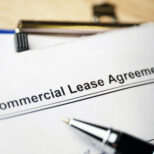
Agreements with highways authorities
20th February 2023 by Claire Taylor
If you develop a site and your scheme includes new roads, you will probably want to get them adopted by the local highways authority. This will shift the long-term burden of maintenance to the highways authority, but there may be short term costs involved which you may not have anticipated. There is more than one way to approach this, and you will probably have to enter into a formal highways agreement, so you will need advice from your solicitor on the obligations you are taking on.
‘Purchasers are wary of buying land with unadopted highways, because they want to avoid incurring repair costs in the future,’ says Claire Taylor, a Partner in the commercial property team with Laceys Solicitors. ‘This is a real incentive for a developer to get new roads adopted, but it may come as a surprise to learn that there is no guarantee that the highways authority will agree.’
Why get a road adopted?
Once a road is formally adopted by a highways authority, it will be maintained at public expense. The other important benefit of having a road adopted is that the public at large has rights to use an adopted highway, without needing to rely on the private right of way that would otherwise be required to get from the nearest public highway to the property. Both features will make a commercial property more appealing to potential purchasers and tenants because they reduce the scope for disputes and expense in the future.
Section 38 agreements
The most common approach is for the developer and the highways authority to enter into a formal highways agreement. The relevant requirements are set out in section 38 Highways Act 1980, which is why they are referred to as ‘section 38 agreements’. If you want to get a new road adopted under a section 38 agreement, you will need to approach the highways authority in advance. This will be the local county council or metropolitan borough council, although in London it could also be Transport for London.
There are some important points to note about adoption under a section 38 agreement:
- You must build the road to a specified standard, as the highways authority will only adopt it if that standard is met.
- Once the road is completed, you will have to maintain it for 12 months before the highways authority will formally adopt it.
- The highways authority will want to be sure that the road will be completed to the required standard. There are usually two aspects to this. Firstly, they will want the right to take over construction of the road if they are not satisfied with the way you are going about it. This is referred to as a ‘step-in’ right. Secondly, they will want some sort of guarantee, either from a third-party guarantor or in the form of a bond from a bank or insurer, which they can call on to recover any costs they incur in completing the road to the required standard. As the developer, you will be required to find a guarantor or pay for the bond.
- In some areas, you may be required to make advance payments to the highways authority to cover potential costs they might incur if they have to carry out construction work themselves. These should be recoverable when the highway is adopted but it will affect your cashflow during the construction and initial maintenance periods.
- You may also have to pay a lump sum to the highways authority when the road is adopted.
The advantage of a section 38 agreement is that the developer will have certainty that as long as the road is properly built, the highways authority will adopt it. The disadvantage is the cost to the developer in the early years.
Adoption under section 37
The alternative to a section 38 agreement is for the developer to complete the road and then serve a notice under section 37 Highways Act 1980, requiring the highways authority to adopt it. This may avoid some of the upfront costs associated with the section 38 process, but the main disadvantage is that the highways authority may refuse to adopt the road, if they do not believe it will be of sufficient benefit to the public to justify the cost of maintaining it at public expense. If the highways authority takes this view, the matter will be referred to court to be settled. This uncertainty means that a developer who decides to rely on a section 37 agreement could be left with the long-term cost of maintaining a private road.
Other points to consider about adoption
Once a highway is adopted, the top layer of the highway land is legally transferred to the highways authority. This means that if you have a leasehold interest in the land you are developing, you must get your landlord to join in the adoption process. Similarly, if you have a mortgage your lender will need to be involved.
Bear in mind that once it has been adopted you will not be able to divert or close a road on your development without a formal legal process.
Section 278 agreements
The other type of highways agreement you may come across as a developer is a section 278 agreement, which is relevant if the planning permission for your development requires you to carry out alterations or improvements to an existing highway. As with a section 38 agreement, you will be required to carry out the work to the standard required by the highways authority at your own expense and you will probably also have to provide a guarantor or bond as security. As a section 278 agreement applies to existing highways, there will usually be detailed requirements about how and when the work is carried out, to minimise disruption to the public. If you are going to build a new road on your own land and have that adopted as part of the same development, you will need to enter into a section 38 agreement as well.
How we can help
Highways agreements set out detailed obligations and require developers to incur significant expense, so it is vital to make sure you understand what you are taking on. Our team of commercial property lawyers can guide you through the process.
For further information, please contact Claire Taylor on 01202 377817 or email c.taylor@laceyssolicitors.co.uk
This article is for general information only and does not constitute legal or professional advice. Please note that the law may have changed since this article was published.



